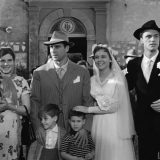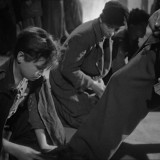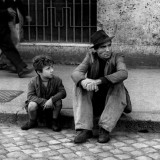Five years after his masterpiece, Miracolo a Milano – Miracle in Milan (1951), director Vittorio De Sica with screenwriter Cesare Zavattini, return to a familiar neorealist theme – social troubles of a young couple, played by unprofessional actors, facing a housing problem during Italy’s economic boom. Newlywed couple, Gabriella Pallotta – Luisa (as Gabriella Pallotti)… Continue reading Il Tetto – The Roof (Vittorio De Sica – 1956)
Tag: vittorio de sica
Shoeshine – Sciuscià (Vittorio De Sica – 1946)
Ever wondered what started the Oscar for Best Foregin Language Film category? It was Shoeshine, Vittorio De Sica‘s fifth film that initially received a Special Academy Award in 1948 and two years later for his masterpiece The Bicycle Thief. Shoeshine is a special film for many reasons. First, it marks the start of one of… Continue reading Shoeshine – Sciuscià (Vittorio De Sica – 1946)
The Children are Watchin Us – I bambini ci guardano (Vittorio De Sica – 1944)
This cinematic masterpiece was filmed in Rome during the summer of 1942 before the Nazis arrival in October that started the occupation and devastation in the city. That’s why Rome in this film looks very clean, normal and tranquil – the serenity before the war storms broke out. Stylistically, the film belongs to the Transitional… Continue reading The Children are Watchin Us – I bambini ci guardano (Vittorio De Sica – 1944)
Bicycle Thieves – Ladri di biciclette (Vittorio De Sica – 1948)
Stories about the common man emphasizing social issues, scenes shot in actual locations, and the use of non-professional actors – are the key ingredients of the Neorealist film movement in postwar Italy, which this film is one of its prominent expressions. Directed by Vittorio De Sica and adapted for the screen by Cesare Zavattini based… Continue reading Bicycle Thieves – Ladri di biciclette (Vittorio De Sica – 1948)
Umberto D. (Vittorio De Sica – 1952)
In one of the greatest accomplishments of the Neorealist film movement, Vittorio De Sica dedicates this film to his father and effectively captures the grim life of the elderly in post-war Italy. The film paints a vividly emotional picture of Umberto D. (Carlo Battisti non-proessional actor – a university professor from Florence), an older man… Continue reading Umberto D. (Vittorio De Sica – 1952)





